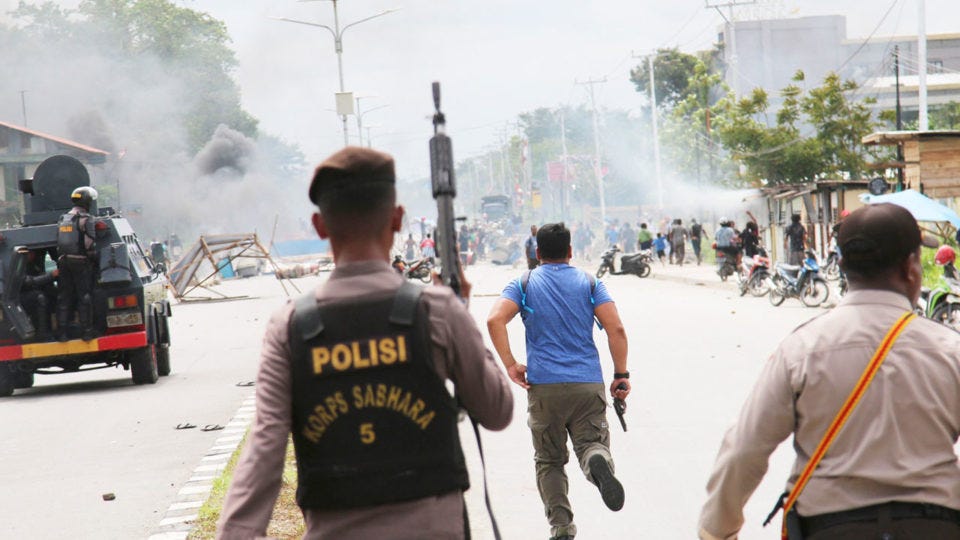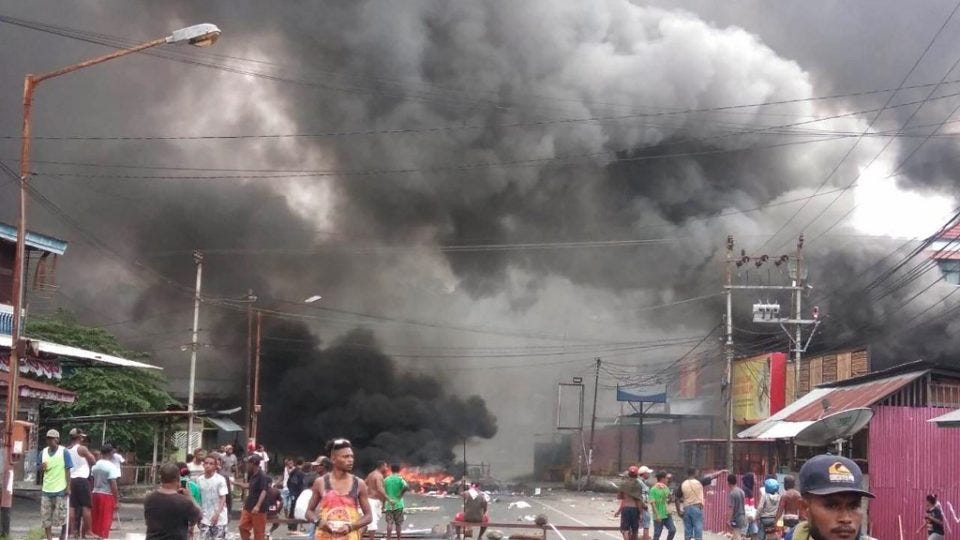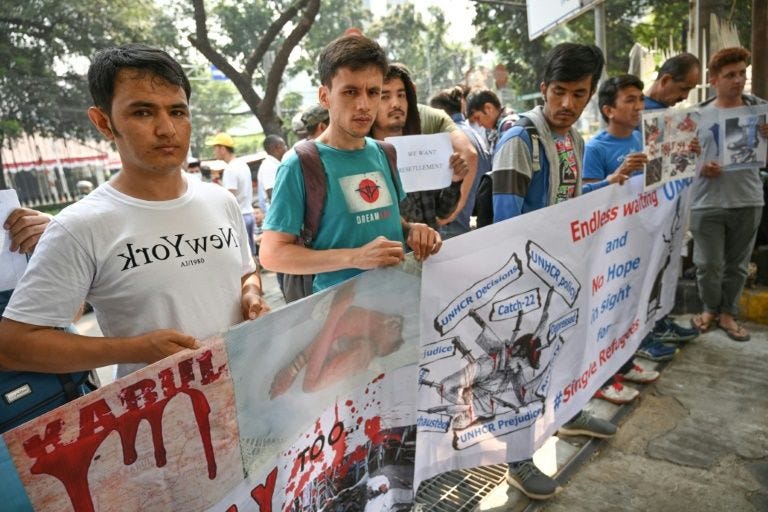Racism and a reckoning in Papua | Palm-oil-free free |Indonesia Intelligencer (August 17-23)

Welcome to this free edition of Indonesia Intelligencer, a concise weekly digest of the most important news and thought-provoking features from the archipelago. We occasionally send out free editions of I.I. like this to show potential readers what this newsletter is all about, but only paid subscribers will receive every week’s newsletter and have full access to our archive.
You can click here to get a free one-month trial subscription to Indonesia Intelligencer so you can start getting the most essential political, business, and cultural news of the week delivered to your inbox every Friday. Thanks for reading and have a great weekend!
Business

Another rate cut
Indonesia lowered its seven-day repurchase rate by 25 basis points to 5.5 percent Thursday in a bid to spur economic growth amid increasing risks from a global slowdown and an intensifying US-China trade war.
This is the second rate cut in two months, after Bank Indonesia cut the benchmark interest rate for the first time in nearly two years in July.
Free from “palm oil-free”
An official from the National Agency of Drug and Food Control this week said that products labeled “palm oil-free” or “no palm oil” found at high-end Indonesian stores will be removed from shelves.
The policy comes as Indonesia, along with Malaysia, are upping their fight against what they say are discriminatory actions against palm oil by developed countries, such as those in the European Union, which risk a trade war with the palm oil giants after the bloc decided to place stricter limits on the commodity over deforestation concerns.
Malaysia to surpass Indonesia in India
Malaysia is set to outpace Indonesia in palm oil exports to India this year as Kuala Lumpur enjoys fewer trade hurdles than Indonesia with the major palm oil importer.
In the first half of 2019, Malaysia has exported 2.14 million tons of palm oil — surpassing all of last year’s exports of 2.08 million tons — to India on the back of favorable import duties. Indonesia has exported 2.13 million tons thus far — over a third of its 2018 shipment — and is keen to strike a deal with India to help it stay competitive with Kuala Lumpur.
Go-Jek’s Malaysia go-ahead
Go-Jek is likely to place Malaysia next on its Southeast Asia expansion plan after the Malaysian government agreed in principle to allow Go-Jek’s ride-hailing service to operate in the country.
The company’s Malaysia expansion still requires the ratification of new laws governing where and how motorcycle ride-hailing apps can operate within the country. Go-Jek is expected to operate within two months following its approval.
Go-Jek has successfully launched services in Singapore, Vietnam and Thailand within the past year.
Scan-’n’-pay more popular than ever
Bank Indonesia announced that, in July, Indonesians made the most e-payment transactions in a month ever thus far, with IDR12.93 trillion (US$906.3 million) spent from over 476 million transactions.
That figure represents an incredible 262.67% increase year-on-year. The previous record for monthly transactions was set in May 2019, which saw e-payment services used in over 422 million transactions valued IDR12.81 trillion.
Standardized QR code payments
Bank Indonesia is set to standardize QR code digital payments in the country after drafting regulations for Quick Response Indonesia Standards (QRIS), which will come into effect nationally on Jan. 1. QRIS, in theory, will allow interconnectivity and interoperability between e-payment platforms in Indonesia.
Startup unicorn Bukalapak, the first online marketplace to adopt the new payment system, says it has already signed up at least 1,000 MSMEs for QRIS.
WhatsApp Pay reportedly close
A report by Reuters revealed that instant messaging service WhatsApp is in advanced talks with Indonesian digital wallet firms to introduce an e-payment feature, dubbed WhatsApp Pay, to users in the country.
A source close to the matter said that, in Indonesia, the feature would allow for cheaper fees on inter-bank money transfers as it would cut out service costs.
Recommended reads
How Indonesia avoided Brazil’s economic fate (The Diplomat): Since 2014
Indonesia’s economy has grown steadily at around 5 percent per year. This led to the comfortable re-election of the incumbent president Joko “Jokowi” Widodo on the back of his popular pro-growth economic policies in April 2019, and he looks set to have a decent legislative coalition backing his second term in office. The economy is growing and the political environment is relatively stable. How did Indonesia manage to avoid Brazil’s fate, despite being exposed to many of the same potential weaknesses?
EU vs. Indonesia: Is it really a trade war? (Deutsche Welle)
The European Union has slapped countervailing tariffs on imports of subsidized biodiesel from Indonesia. The Southeast Asian country has threatened to retaliate but experts say counter tariffs could be self-destructive.
Politics

Racism sets off protests and riots in Papua
On Saturday — Indonesia's Independence Day — authorities tear-gassed and detained 43 Papuan university students in the city of Surabaya for allegedly desecrating the Indonesian flag, during which time they were reportedly pelted with racist abuse by authorities.
Videos of the incident quickly went viral, leading thousands to protest on Sunday in major West Papuan and Papuan cities, including in Manokwari, where protesters torched a local parliament building.
There were more reports of protests and riots throughout the week, including in Jayapura, Timika, Sorong and Fakfak.
In Sorong, some 250 inmates broke out of a local prison amidst the unrest (most have reportedly already turned themselves back in)
The police say they have sent an additional 1,200 security personnel to the already heavily militarized provinces to secure the situation.
After first severely throttling internet access, the government decided on Wednesday to fully block public internet access in Papua and West Papua, justifying the move as a means to prevent the spread of fake news causing unrest. The move has been blasted by numerous rights groups and journalist associations.
On Thursday, President Joko Widodo said he had ordered the head of the National Police to “take stern, legal action against acts of racial and ethnic discrimination” and said he would invite public figures from the two provinces to the state palace next week to help ease tensions.
Today, the president claimed that West Papua “has returned to normal”, but independence protesters dismissed the claim and said protests were likely to continue
For more historical context on the current situation:
Riots in West Papua: why Indonesia needs to answer for its broken promise (The Conversation)
West Papua and its troubled history with Indonesia (Asia News Network)
New capital coming to East Kalimantan?
Following last week’s formal request to parliament by President Jokowi to enact his plan to move the capital from Jakarta to a still unknown location in Kalimantan, this week Minister of Agriculture and Land Planning Sofyan Djalil narrowed down the possibilities by saying that the country’s new seat of power will be built in East Kalimantan
However, President Jokowi contradicted Sofyan, saying the new capital’s location in Kalimantan was not yet set in stone and would still depend on the results of one or two more studies.
Previous reports had suggested that one of the most likely locations for the new capital city would be Kutai Kartanegara in East Kalimantan.
Sofyan said that an area of 3,000 hectares would be prepared for the first phase of the new capital’s development, including essential government and legislative buildings. He said the city would eventually cover a total area of about 200,000-300,000 hectares.
Also this week, Minister of Public Works and Public Housing (PUPR) Basuki Hadimuljono, released his ministry’s proposed design ideas for the new capital city, which include abundant green spaces and parks.
According to the government’s ambitious proposed timetable, construction on the new capital will begin in 2021 and the transfer of functions will take place from 2023-2024.
Surya Paloh pushing NasDem against Jokowi
Rumors continue to swirl about the possible departure of the NasDem party from the government coalition after its chairman, Surya Paloh, implied that President Jokowi’s choice of cabinet ministers was based primarily on economic interests
The president announced last week that he had finalized the list of names for his second term cabinet but has yet to announce them (see last week’s newsletter). There are suggestions that many within the government coalition are unhappy with the limited number of positions afforded them in the roster.
Surya first invited rumors of his displeasure with the president when he met with Jakarta Governor Anies Baswedan last month and suggested that his party would support his potential presidential run in 2024.
Recommended reads
Nationalism: Poisoned chalice or panacea for Indonesia? (Jakarta Post)
But reducing the long-standing persecution against Papuans to a simple problem of racism ignores the larger context of why the injustice persists, why suspicion lasts and why tension remains between the central government and Papuans.
This is not to underestimate the role that racism plays in our relationship with Papuans or to downplay the fact that racism does exist in our society, but it constitutes only half of the equation and that in the final analysis, racism is only a symptom of a greater, more chronic problem that is a specific brand of nationalism that is unique to Indonesia.
What’s behind Indonesia’s move to reclaim control of Riau Islands airspace from Singapore? (SCMP)
Singapore has been in control of flights above some areas of the province – such as Batam, Tanjung Pinang, Bintan and the Natuna Islands – since 1946. This was approved by the International Civil Aviation Organisation (ICAO), that felt the island nation would be able to ensure high standards of safety and efficiency.
But Widodo, who will embark on his second term from October, has given his administration a directive to claim back the FIR by the time his second – and final term – ends in 2024.
Other News and Notable Features

Abdul Somad reignites blasphemy debate
A recently resurfaced video clip of statements made by celebrity preacher Abdul Somad in which the hugely popular preacher talks about Christian crosses containing “infidel genies” triggered many outraged responses and led to numerous parties reporting him to the police for blasphemy
The Indonesian Ulema Council (MUI) defended the preacher’s statements, saying they should be protected as they were given in the context of a closed session in a mosque in which he was only speaking to other Muslims, but MUI did ask the police to search for the person who uploaded the 3-year-old clip to investigate them for possibly spreading hate speech.
The Communion of Churches in Indonesia ecumenical group echoed the sentiments of many rights activists for saying they did not think that Somad should be charged with blasphemy, instead using the incident to reiterate calls to repeal the country’s controversial blasphemy laws, which may be further codified in a revision to the Criminal Code set for ratification in the near future.
Time running out for refugee care in Jakarta
The fates of some 1,500 asylum seekers in West Jakarta is in question after the Jakarta Regional Council (DPRD) announced that the government would stop providing them aid by the end of this month
The refugees are currently staying in a temporary shelter in Kalideres, West Jakarta. While West Jakarta locals opposed the refugees’ presence in the subdistrict, more have arrived to take refuge at the shelter since. Many had been living on the streets prior.
The DPRD says the provincial government will stop extending aid to the asylum seekers on Aug 31, who will have to vacate the shelter.
The government is pushing the UNHCR, along with the International Organization for Migration (IOM), to repatriate the refugees, but the refugee organizations do not yet have any solutions for the immediate care of the 1,500 refugees.
Refugees in Jakarta and other cities also held demonstrations this week over their perpetual state of legal limbo. In Makassar, some 600 protesters demonstrated in front of the Australian consulate and presented a letter to diplomats calling on Canberra to reverse its “inhumane” entry rules for refugees in Indonesia.
Recommended reads
Indonesia’s Journalists Grapple With Islamism (Human Rights Watch)
The rise of conservative Islamism poses an increasingly significant challenge for journalists in the world’s largest predominantly Muslim country. Harassment, discrimination, and violence directed at religious minorities are facilitated by a legal architecture, established in 2006, that purports to maintain “religious harmony.” In practice, it undermines religious freedom. And some Indonesian journalists find it difficult to separate their religion and their profession.
“Fundamentalism grows in silence, but it can grow quickly in many sectors, including journalism,” said the Muslim scholar Rumadi Ahmad.
The Neo-JI threat: Jema’ah Islamiyah’s resurgence in Indonesia follows an old playbook (New Mandala)
Though Neo-JI lacks military capabilities, its strength—like that of JI in the past—lies in its patient and opportunistic establishment of grassroots support. To address such a threat, Indonesia must look beyond hard-approach counter-terrorism operations and better invest in sustainable soft-approach measures that target the social roots of Neo-JI. Concerning characteristics shared by Neo-JI and its predecessor remind of three important facts about terrorism in Indonesia. First, the threat represented by terrorist groups does not merely lie in their capacity to conduct violence. Second, professional terrorist groups are not short-sighted but strategic, patient and calculate long-term gains. Last, terrorism is a protean enemy.
Why do millions of Indonesian women still quit work after marriage and kids? (Indonesia at Melbourne)
Indonesia has a persistent gender gap in workforce participation between men and women. This is partly explained by cultural norms around gender-based roles and responsibilities in the household, but remains significant even in comparison to culturally similar countries in the region.
Indonesia should put more energy into renewable power (The Interpreter)
Air pollution is worsening in Jakarta and West Java, while tens of millions of people experienced a day-long blackout earlier this month after gas-powered electricity generators failed and significant proportions of eastern Indonesia do not have reliable power supplies. So why does Indonesia remain so reliant on fossil fuels?
For an archipelago as large as Indonesia, located along the equator and on top of a ring of active volcanoes, you wouldn’t be wrong in thinking the nation could become one of the world’s leaders in renewable energy.
Top Coconuts News



